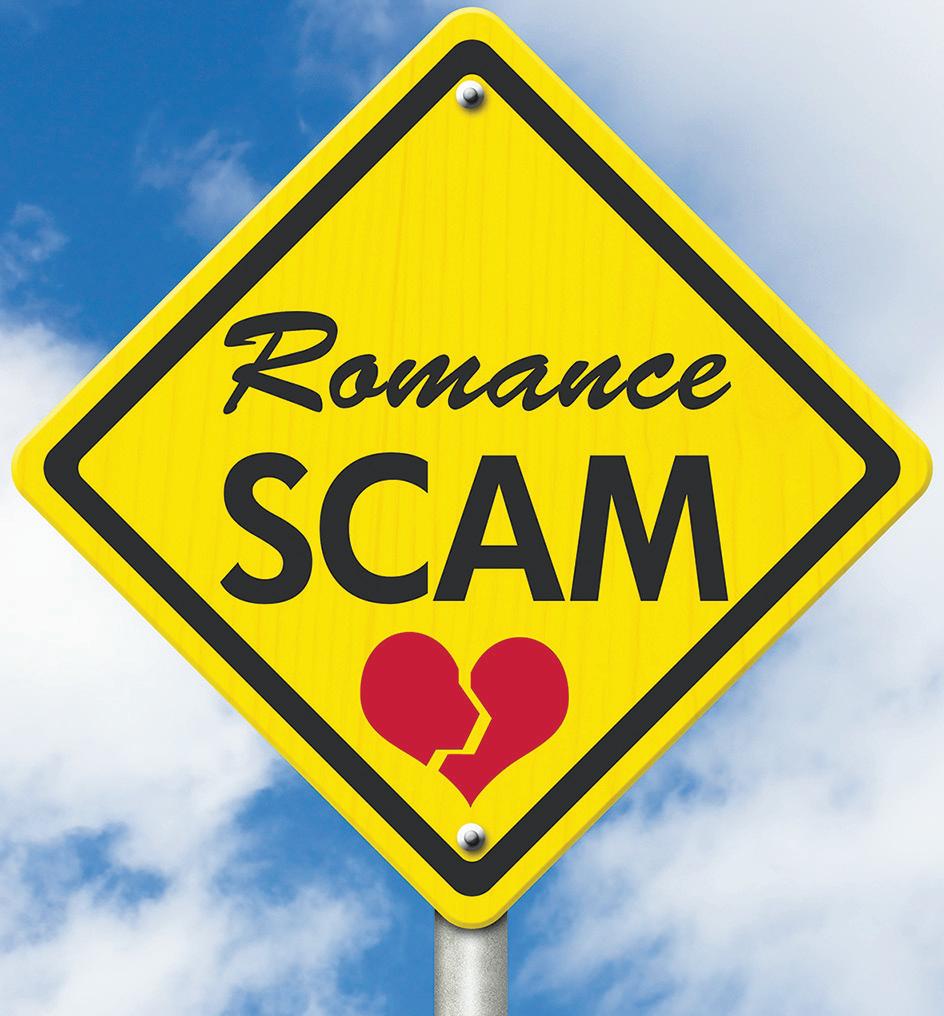
2 minute read
Romance scams – true love or something else
Love is in the air, but is this true love or a scam?
Romance scammers want potential victims to believe they are in love and feel good about themselves. These scammers create potentially romantic relationships by tugging at heartstrings and building false trust. Then use this trust to con them out of hundreds or thousands of dollars.
Advertisement
According to the Federal Trade Commission, losses related to romance scams hit a record high of $547 million in 2021. The median loss per victim was $2,400. Adults 70 and older were more likely to be cheated out of more money, with the average loss in this age group exceeding $9,000.
Reports of these scams have steadily risen during the past several years and likely will continue. Older adults are twice as likely as younger adults to lose money to sweetheart scams, so it’s essential to warn aging parents and neighbors about the signs of these scams. There’s no guarantee you can prevent seniors from becoming victims, but helping them recognize the red flags can reduce the risk that this con will sweep them up.
State Attorney Phil Archer notes in his monthly newsletter, The Brief, that loneliness and lockdowns have created the perfect scenario for scammers hoping to take advantage of singles looking for love. According to the Better Business Bureau and a recent survey conducted by Wells Fargo, scams are up more than 20% from the previous year.
In the most common form, the scammer posts super attractive photos and profile details stolen from real Facebook or other accounts. They then reach out to the victim via social media or a dating app. Often they’ll claim to be out of the country or in the military stationed overseas, essentially catfish scams designed to gain the victim’s trust. They claim to fall in love quickly, make plans for the future, and then ask for the money needed for medical, travel or other expenses.
In some cases, the scammers ask for revealing photos (extortion), ask for personal information (identity theft), or send attachments that infect computers with malware.
How to avoid romance scams:
1) Avoid too-hot-to-be-true profiles;
2) Don’t give out personal information;
3) Don’t share financial information or send money to anyone you haven’t met in person;
4) Conduct a reverse image search to see where else the person’s image appears;
5) Use burner phones and email only for dating/social media;
6) Be suspicious of anyone who won’t video chat (no Wi-Fi, smartphone or camera);
7) Search chat messages/emails to see if they use a prepared script;
8) Do a Background Search.
Protect yourself and others from romance scams
Romance scams are not limited to Valentine’s Day, so be smart about who you connect with, and save yourself the worry about Cupid’s arrow striking your wallet instead of your heart!
Here are some ways you can protect yourself and your friends and family from romance scams:
Don’t give a new friend access to your money — including ATM cards, bank accounts, credit cards or investment accounts.
Place an order of our romance scam prevention and awareness placemats on the Consumer Finance website, and share with people in your community. The placemats can be used year-round to help educate older adults and others about romance scams.
Report any crimes to your law enforcement’s non-emergency number. If you suspect that someone is a victim of elder abuse or financial exploitation, report it to Adult Protective Services (APS). Find your local APS at eldercare.gov. If you think the person’s safety may be at risk, call 911.
For more information on Romance Scams, visit the AARP, Consumer Protection Finance Bureau, U.S. Army, and Social Catfish websites. Report suspected online romance scams to the FBI’s Crime Complaint Center and the Federal Trade Commission.
Sources include: consumerfinance. gov/about-us/blog/guard-your-walletwell-your-heart-romance-scams/, AARP, BBB, FTC, and ABCNews7, and TheBrief Vol9issue2. SL
Solution on page 27















